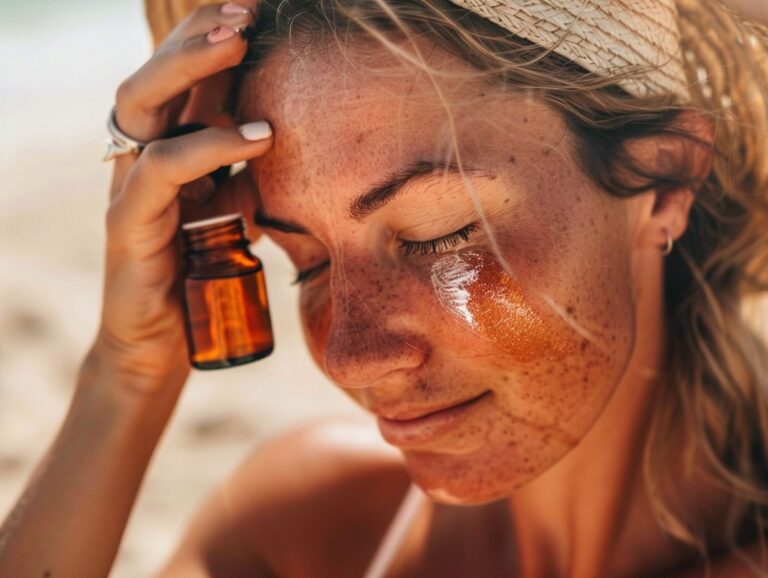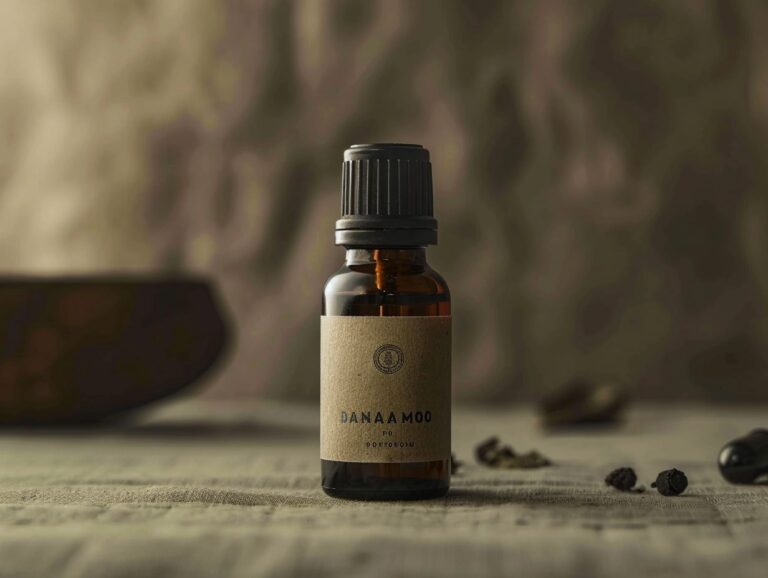Do Essential Oils Keep Wasps Away
Essential oils have been gaining popularity not just for their pleasant aromas, but also for their potential insect-repelling properties.
We will explore the use of essential oils to keep wasps away. From understanding the chemical components of essential oils that repel wasps to discovering which oils are most effective, we will cover everything you need to know about using natural methods to deter these buzzing pests.
Get your favorite essential oil ready and let’s get started!
Key Takeaways:
What Are Essential Oils?
Essential oils are highly concentrated plant extracts that capture the aromatic essence and beneficial properties of various plants.
Extracting essential oils involves methods like steam distillation, expression, or solvent extraction, where the volatile compounds are separated from the plant material. Once extracted, these oils can be used for a variety of purposes, such as aromatherapy, skincare, and home cleaning.
- Peppermint oil is known for its cooling and invigorating properties.
- Citronella oil is commonly used as a natural insect repellent.
- Eucalyptus oil’s decongestant properties make it popular for respiratory support.
- The calming aroma of lavender oil is often used to promote relaxation and sleep.
What Are Wasps?
Wasps are flying insects that belong to the Hymenoptera order and are known for their stinging ability.
These insects typically have slender bodies with a narrow waist, distinct from bees. Their vibrant colors serve as a warning to potential predators of their painful sting. Wasps are social creatures, with some species constructing intricate paper nests while others are solitary. They can be found in various habitats, from forests and meadows to urban areas. When agitated or threatened, these insects can become aggressive, increasing the likelihood of stinging. It’s crucial to exercise caution around wasps and their nests to avoid potential risks of painful stings and allergic reactions.
Why Do People Want to Keep Wasps Away?
People aim to keep wasps away due to their potential threat as pests that can disrupt the environment, cause property damage, and pose risks of stings to individuals.
Controlling wasps is crucial for maintaining a safe and peaceful outdoor space. Wasp nests near homes can lead to structural damage, and their presence can be a nuisance during outdoor activities. For those allergic to wasp stings, encounters can pose serious health risks.
Eliminating wasps from gardens and yards can also protect plants and ecosystems from potential harm, ensuring a thriving outdoor environment for all inhabitants. By implementing effective wasp control measures, one can enjoy their outdoor spaces without the worry of unwelcome visitors.
How Do Essential Oils Work on Wasps?
Essential oils act as natural repellents against wasps by creating scents that deter these insects from certain areas.
This repelling action is based on the strong aromatic compounds found in essential oils, which interfere with the wasps’ ability to communicate and navigate effectively. When a wasp encounters the scent of essential oils such as stink bug repellent oils, it confuses their sensory receptors, making the area inhospitable for them to build their nests or forage for food.
Essential oils present a safe and environmentally friendly alternative to chemical pesticides, as they do not pose a risk to humans, pets, or beneficial insects like bees. Their natural origin makes them biodegradable and sustainable for long-term use in controlling wasp problems without harming the ecosystem.
What Are the Chemical Components of Essential Oils That Repel Wasps?
The chemical components in essential oils that repel wasps include compounds like citronellal, eugenol, and geraniol, known for their insect-repelling properties.
These compounds act as powerful natural deterrents for wasps due to their strong odors and properties that disrupt the insects’ communication and navigation systems.
- Citronellal, commonly found in citronella oil, emits a strong citrus-like scent that repels wasps and other insects by overwhelming their senses.
- Eugenol, present in clove oil, possesses insecticidal properties that can deter wasps from nesting in specific areas.
- Geraniol, a compound found in rose oil, has a floral aroma that repels wasps while being pleasant to humans, making it an excellent choice for natural wasp repellents.
Which Essential Oils Are Effective in Keeping Wasps Away?
Several essential oils have proven effective in repelling wasps, such as peppermint oil, lemongrass oil, citronella oil, eucalyptus oil, tea tree oil, and lavender oil.
These essential oils work as natural insect repellents due to their strong scents that deter wasps without harmful chemicals.
- Peppermint oil emits a powerful aroma that wasps find overwhelming
- Lemongrass oil and citronella oil act as effective deterrents with their strong citrusy fragrances
- Eucalyptus oil is known for its antiseptic properties and is an excellent wasp repeller
Applying a few drops of tea tree oil or lavender oil on cotton balls and placing them strategically around outdoor areas can help keep wasps at bay naturally. These oils not only repel pests but also add a pleasant aroma to the surroundings.
Peppermint Oil

Peppermint oil, with its minty aroma, serves as an effective natural insect repellent, including wasps, when used in spray form.
Creating a peppermint oil spray is a simple and eco-friendly way to keep pesky insects at bay. To make your repellent, mix a few drops of peppermint oil with water in a spray bottle. Shake the bottle well to ensure proper blending of the ingredients. Next, you are ready to use your DIY insect deterrent. Simply spray the solution around entry points like windows and doors, as well as areas where wasps may nest.
Lemongrass Oil
Lemongrass oil, known for its citrusy scent, can be used in a blend with other oils to create an effective wasp-repelling technique.
When blending lemongrass oil with other essential oils to enhance its repellent properties against wasps, it’s crucial to consider the complementary scents and properties of the oils. For instance, cedarwood oil can add a woody undertone that deters wasps, while peppermint oil can contribute a minty freshness to the blend. Lavender oil not only aids in repelling wasps but also brings a calming element to the mixture.
It is recommended to mix a few drops of lemongrass oil with equal parts of other essential oils in a dark glass bottle to preserve their potency. Shake the blend gently before applying it to areas where wasps tend to frequent, such as doorways or outdoor dining areas.
Citronella Oil
Citronella oil, derived from specific plants, can be used at home to create a natural barrier against wasps and other insects.
One of the key benefits of citronella oil is its pleasant citrusy scent, which not only helps in warding off pests but also adds a refreshing aroma to your living space. To maximize its effectiveness, consider placing a few drops of citronella oil near entry points such as doors, windows, and outdoor seating areas where wasps are known to frequent. Its natural properties make it a safer alternative to chemical insecticides, making it a popular choice for those looking to deter pests without harsh chemicals.
Eucalyptus Oil
Eucalyptus oil, when combined with soap, can be an effective solution to deter wasps from building nests in specific areas.
By mixing eucalyptus oil with liquid soap in a spray bottle and diluting it with water, you can create a natural deterrent that not only repels wasps but also leaves a refreshing scent. It’s important to shake the mixture well before each use to ensure proper emulsification.
Target areas where wasps tend to nest, such as under eaves, in garden sheds, or around outdoor seating areas. The strong fragrance of eucalyptus oil disrupts the wasps’ ability to communicate and navigate, making them less likely to establish colonies in those spots.
Tea Tree Oil
Tea tree oil is a potent essential oil that aids in the control of pests like wasps due to its natural repellent properties.
When properly utilized, tea tree oil can act as a deterrent for wasps, making it an excellent natural alternative to chemical pesticides. The strong aroma of tea tree oil disrupts the communication signals among wasps, hindering their ability to build nests and congregate in certain areas. By diluting tea tree oil with water and spraying it around potential entry points and nesting sites, you can effectively create a barrier that discourages wasps from settling in your surroundings.
Lavender Oil
Lavender oil, with its calming scent, can be utilized as a method to protect property from wasps by creating a fragrant barrier.
Wasps are known to be deterred by the powerful aroma of lavender oil, which disrupts their ability to communicate and navigate effectively. To apply this natural repellent, mix a few drops of lavender oil with water in a spray bottle and evenly spritz around doors, windows, and other entry points. Placing infused cotton balls soaked in lavender oil strategically in outdoor spaces can help prevent wasps from establishing nests. The long-lasting effects of lavender oil make it a sustainable and environmentally friendly option for wasp deterrence.
How to Use Essential Oils to Keep Wasps Away?
Essential oils can be effectively used to keep wasps away through DIY natural sprays that can be applied in outdoor areas.
Another technique to repel wasps using essential oils is by soaking cotton balls in a mixture of peppermint oil and water and placing them strategically around the environment. Wasps are naturally averse to the strong scent of peppermint and will avoid areas where it is present.
Creating a eucalyptus-based spray can also be incredibly effective in deterring these pests. The refreshing aroma of eucalyptus serves as a natural repellent, keeping wasps at bay while enhancing the environment with its pleasant fragrance.
Diffusing Essential Oils

Diffusing essential oils through diffusers is a popular technique to disperse their scents and repel wasps effectively from indoor and outdoor areas.
When using essential oils to deter insects like wasps, it’s essential to consider the type of diffuser and the oil used for optimal results. Ultrasonic diffusers, for example, are ideal as they maintain the oil’s properties, ensuring maximum effectiveness. Certain oils such as peppermint, citronella, and lemongrass are known for their insect-repelling properties.
To enhance the repellent effect, place the diffuser strategically near entry points or outdoor seating areas. Regular maintenance of the diffuser and proper ventilation are also crucial for long-lasting results.
Creating a Spray
Creating a DIY spray with essential oils and water is an effective way to cover larger outdoor areas and keep wasps at bay.
When making your own natural spray for repelling wasps, ensure to choose essential oils bug repellent such as peppermint, citronella, or eucalyptus. These oils not only serve as a deterrent but also leave a pleasant fragrance in your outdoor spaces.
Mix a few drops of your chosen oil with water in a spray bottle, ensuring the solution is well-diluted to avoid any skin irritation. It is important to shake the bottle well before every use to disperse the oils evenly.
Apply the spray generously around the perimeters of your outdoor areas, focusing on entry points and potential nesting spots for wasps. Regular application is key to maintaining the effectiveness of the spray in deterring these pesky insects.
Adding Essential Oils to Candles or Incense
Enhancing candles or incense with essential oils can create a dual-purpose: ambient lighting and natural wasp repellents.
When infusing candles or incense with essential oils, it’s crucial to use high-quality oils to ensure the best results. Start by choosing your favorite scents that also act as effective wasp deterrents, such as peppermint, citronella, or lemongrass.
- For candles, melt the wax and then add a few drops of essential oil when the wax is slightly cooled but still liquid. Stir gently to disperse the oil evenly.
- Regarding incense sticks, you can either roll them in a diluted essential oil solution or place a few drops directly onto the sticks.
By incorporating essential oils into your decorative elements, you can enjoy a peaceful ambiance while keeping pesky wasps at bay.
Are Essential Oils Safe to Use on Wasps?
Using essential oils as repellents on wasps is generally safe and does not harm the environment or beneficial insects like bees when applied correctly.
When using essential oils on wasps, it is essential to dilute them properly with water or carrier oils to prevent any adverse reactions on the wasp or the environment. Proper application methods, such as using a spray bottle or diffuser, can help target specific areas without affecting non-targeted insects like bees. It is also crucial to apply the oils during non-peak bee activity hours to minimize any potential contact with these beneficial pollinators. By following these guidelines, you can effectively repel wasps while maintaining a safe environment for other insects.”
What Are Other Natural Methods to Keep Wasps Away?
Plus essential oils, other natural methods to keep wasps away include using wasp traps, planting insect-repelling plants, and eliminating attractants.
Wasp traps can be set up using sweet baits that attract the wasps and then trap them inside the container. These traps are a simple and effective way to reduce the population in your surroundings.
Cultivating specific plants such as citronella, eucalyptus, mint, and wormwood can act as natural repellents. These plants emit scents that repel wasps, effectively reducing their presence near your home.
Modifying the environment by sealing cracks, covering food sources, and keeping garbage tightly sealed can make your property less appealing to wasps, thereby discouraging them from building nests.
Planting Wasp-Repelling Plants
Planting insect-repelling plants like marigolds and mint in your garden can create a natural pest-free patch that deters wasps from nesting.
These specific plants not only add beauty and fragrance to your outdoor space but also serve as a functional barrier against unwanted insect invasions. Marigolds, with their vibrant yellow and orange blooms, release a scent that repels mosquitoes and flies, while mint plants emit a strong aroma that can ward off ants and spiders.
By strategically placing these plants around your garden or patio, you can effectively reduce the presence of wasps and other pests, providing a safer and more enjoyable environment for outdoor activities.
Using Wasp Traps
Utilizing commercial or DIY wasp traps is an effective method to control wasp populations in outdoor areas and reduce the risk of stings.
Regarding wasp traps, there are various options available for those dealing with pesky wasp infestations. DIY traps can be made using simple household items like soda bottles or containers with sweet baits to attract the wasps. On the other hand, commercial traps are specifically designed products that come in different forms such as hanging traps, baited stations, or even electronic traps, offering a more convenient solution for managing wasp problems.
Both types of traps have their pros and cons. DIY traps are cost-effective and customizable, but may not be as effective as their commercial counterparts that are often designed to attract wasps more efficiently. Commercial traps come in different sizes and shapes, catering to various needs and preferences, and are usually equipped with mechanisms to trap the wasps once they are lured in. Whichever type you choose, proper placement and regular maintenance are key to maximizing their effectiveness in keeping wasps at bay and ensuring a safer outdoor environment for you and your family.
Removing Wasp Attractants

Eliminating sources of food and water, sealing garbage cans, and sealing cracks in structures can provide relief by reducing conditions that attract and sustain wasps.
Keeping outdoor eating areas clean and free of spills will help avoid inviting these buzzing pests. Opt for natural, subtle scents over strong fragrances that can unknowingly attract wasps. Planting repellent herbs such as mint, basil, and lemongrass around your yard can act as a natural deterrent. Consider installing wasp traps at strategic locations to capture these insects before they become a nuisance. Regularly inspect your property for nests and, if found, remove them carefully or seek professional assistance to ensure they are properly dealt with.
Frequently Asked Questions
Do essential oils really keep wasps away?
Yes, essential oils can be effective in repelling wasps due to their strong scents and natural compounds that deter these insects.
Which essential oils are best for keeping wasps away?
Peppermint, clove, lemongrass, and tea tree essential oils are known to effectively repel wasps when used in concentrated form.
Do essential oils harm wasps or other insects?
No, essential oils do not harm wasps or other insects. They simply work as a natural deterrent, making the area less appealing for these pests.
How should I use essential oils to keep wasps away?
You can dilute a few drops of essential oil in water and spray it around doorways, windows, and other areas where wasps may enter. Alternatively, you can also add a few drops to a diffuser to spread the scent throughout your home or outdoor space.
Are essential oils safe for use around children and pets?
Some essential oils may be harmful to children and pets if ingested. It is important to keep essential oils out of reach and consult with a healthcare professional before using them around young children or pets.
Can essential oils completely eliminate wasps?
While essential oils can help repel wasps, they may not completely eliminate them. It is important to also take preventive measures, such as sealing cracks and removing potential food sources, to fully keep wasps away.







